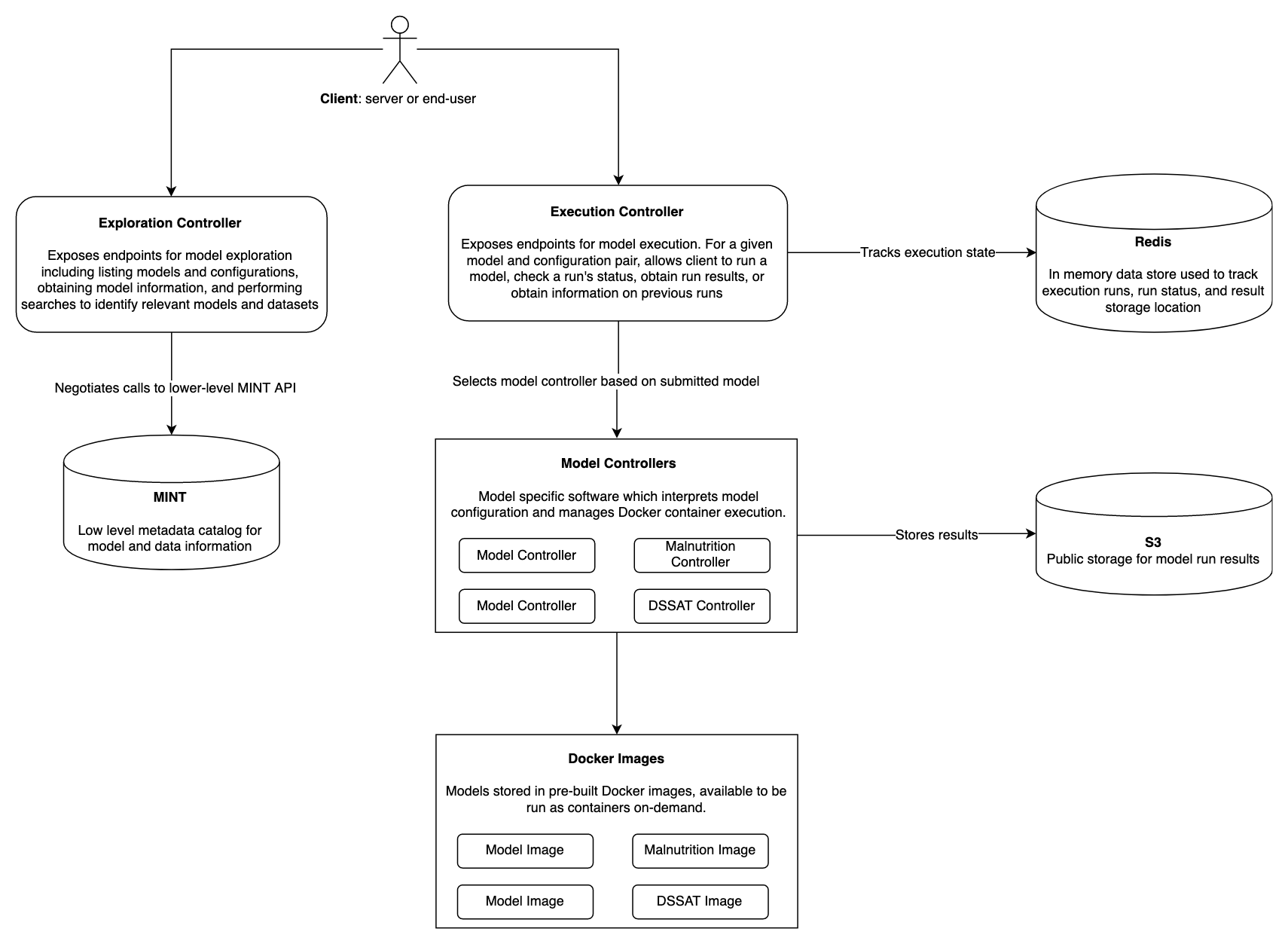This repository contains the Models as a Service (MaaS) API for World Modelers.
The goal of this project is to provide an easy to use, descriptive middleware layer API to facilitate model search and discovery, exploration, configuration, and execution.
Model search, discovery, and exploration is managed through the Exploration Controller. The Exploration Controller provides a high-level interface into MINT which serves as a lower-level model and data metadata catalog. In the future, users will be able to search across models and datasets by:
- Keyword: fuzzy or exact match against words contained in model descriptions, dataset variable names, parameter names, or standard names contained in MINT
- Temporal Coverage: users may search for models or datasets based on the time ranges that they cover
- Geospatial Coverage: users may search for models or datasets that match to a specific geography of interest
Example configurations for using the /search endpoint are available in docs/search.md.
Model execution is managed by the Execution Controller. Models consist of pre-built Docker images that are hosted on an arbitrary server. Running a model requires the creation of a specific model controller, such as this one for Kimetrica's malnutrition model. The model controller is responsible for obtaining a model configuration and tasking Docker to run the model image inside a container with the given configuration. The model controller specifies a Docker container entrypoint, such as this one which is responsible for writing the model output (from within the container) to S3.
Models may be run using the /run_model endpoint. Descriptions of model configurations can be found in docs/model-execution.md. Currently, MaaS supports the following models:
- Kimetrica Population Model
- Kimetrica Malnutrition Model
- Food Shocks Cascade Model
- DSSAT
- Atlas.ai Consumption Model
- Atlas.ai Asset Wealth Model
- CHIRPS
Install Redis using the docker-compose file in the base of this repository. You can do this with docker-compose up (assumes you have Docker installed and running). This will run Redis on port 6379. Then:
# SET $HOME/.aws/credentials to proper key and secret.
# Install MAAS
git clone https://github.com/WorldModelers/ModelService.git
cd ModelService/REST-Server
conda create -n maas_env python=3.7 pip jupyter -y
source activate maas_env
pip install -r requirements.txt
# Install FSC Model. You will get prompted for github credentials.
# This will take quite a bit of time.
cd ../FSC-Integration/
./maas_install.sh
# Install Kimetrica Model.
cd ../../Kimetrica-Integration/
# Please look at this file as you must set the CKAN creds manually right now...
./maas_install.sh
# Install DSSAT
cd ../DSSAT-Integration
./maas_install.sh
# Install Atlas
cd ../Atlas-Integration
./maas_install.sh
# Install Yield Anomalies Model
cd ../Yield-Anomalies-Integration
./maas_install.sh
# HOW TO RUN
cd ../../REST-Server
python -m openapi_server
To use this, run the following:
docker pull swaggerapi/swagger-editor:latest
docker run -d -p 80:8080 swaggerapi/swagger-editor
This will run Swagger Editor (in detached mode) on port 80 on your machine, so you can open it by navigating to http://localhost in your browser.
Unfortunately, the current Swagger Editor does not support code gen for Open API 3.0 and Flask. To generate the server stub use:
wget http://central.maven.org/maven2/org/openapitools/openapi-generator-cli/3.3.4/openapi-generator-cli-3.3.4.jar -O openapi-generator-cli.jar
java -jar openapi-generator-cli.jar generate \
-i model_service_api.yaml \
-l python-flask \
-o Rest-Server-UPDATE
First navigate to the REST-Server directory with cd REST-Server. Next, install the requirements with something like:
pip3 install -r requirements.txt
Now you can run the server with python3 -m openapi_server. You can access the UI at http://0.0.0.0:8080/ui.
You must ensure that the results stored by the model are readable and writable by the process running the server. This location is defined in config.ini. For example, for FSC in production this could look like:
[FSC]
OUTPUT_PATH = /home/ubuntu/ModelService/results/fsc/outputs
However you must ensure that this location is readable and writable by the process running the server. Results will be written by the model's Docker container (which may be root) so you likely need to sudo chmod -r +777 /home/ubuntu/ModelService/results or something like that to ensure appropriate permissions are set.
